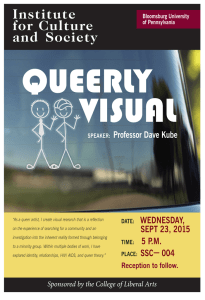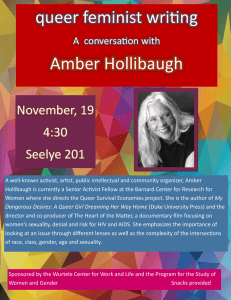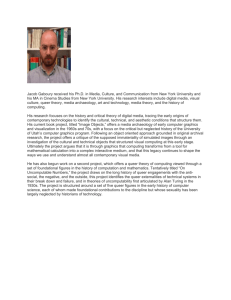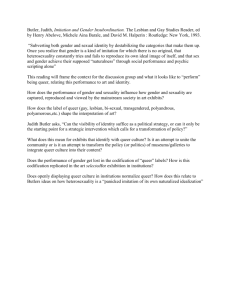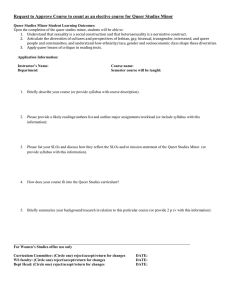Joy Ladin
advertisement
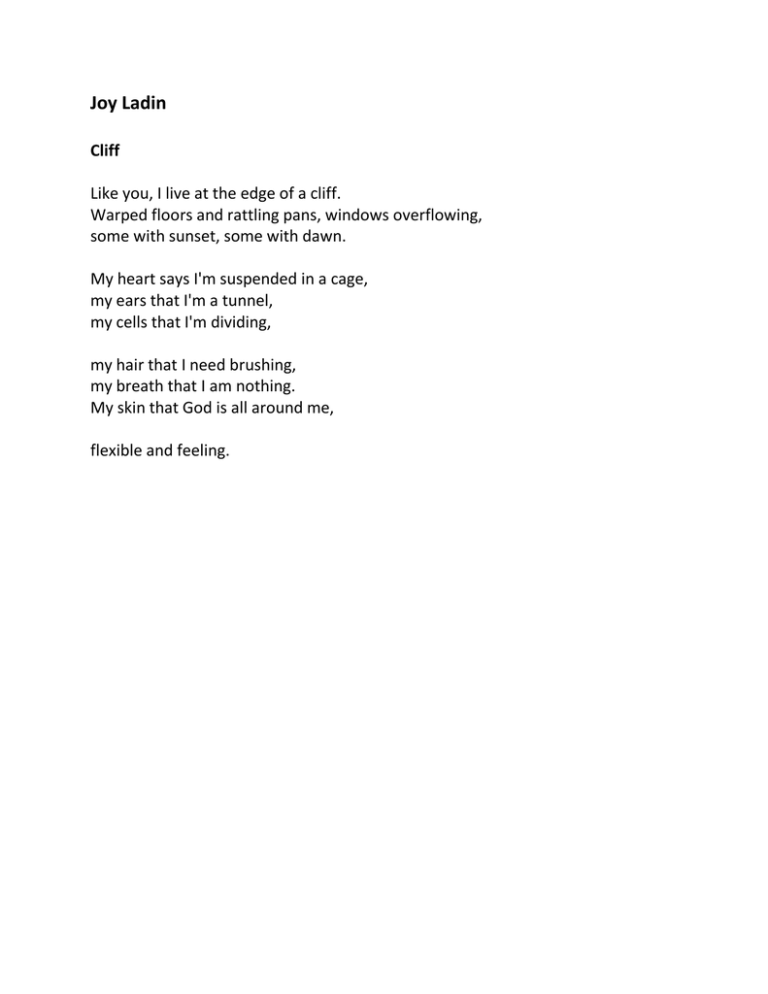
Joy Ladin Cliff Like you, I live at the edge of a cliff. Warped floors and rattling pans, windows overflowing, some with sunset, some with dawn. My heart says I'm suspended in a cage, my ears that I'm a tunnel, my cells that I'm dividing, my hair that I need brushing, my breath that I am nothing. My skin that God is all around me, flexible and feeling. Yael Wender Yael: One has to be ready and open in order to find beautiful things. Though there are also dangers to being open and openness. Something open by default takes in the good with the bad. Open eyes, open doors, open spaces, open-mindedness, open relationships. For me, queer means, first and foremost, this openness, especially with myself. My favorite author Michel de Montaigne writes that he does not regard the individual as a rock that he has stumbled upon. This to me means that when I feel something or find something in myself, I treat it as something real and something that seeks expression. Nadav: LIFT in queebrew (Queer Hebrew) means to be in a state of pure fun and joie-devivre. This word symbolizes the strength of queer individuals, their uniqueness, their histories, and mostly their experiences of thriving in spite and as a result of overcoming stigmatization, marginalization, and discrimination. When we lift, we go back to the radical and powerful message of the 60s that has already been forgotten: we're here, we're queer, we lift, get used to it (and join us). Patricia (Trish) Shoa At home: Since I moved in to this apartment some years ago I have had visits from seven individuals, eight now including Yisha. One was a woman who was in my conversion class with me—married to a Jew, she had raised their daughters to be Jewish—who dunked in the mikveh and took her Hebrew name before going in for some chancy brain surgery; she came in once to use the bathroom. My daughter came after she left college having completed two years of a four-year program, stayed for a year and left to live with her dog, her boyfriend, and their two cats. The rest are all dear friends who have helped me in my recovery, keeping me clean and sober since February, 2006. I found my way to a synagogue while looking for a spiritual relationship with a higher power, necessary for my growth in the twelve-step program which it turns out has saved my life. I have heard it said before, so I know that I am not the only one for whom becoming a Jew felt like coming home. At work: My friendship with T. is a kind of oasis at work... T. and I swap coffee and mental and emotional support as best we can, sometimes not for months, sometimes daily. I admit I ache when T. goes to Michigan each August, although she comes back the better for it. Mischa Haider One warm summer night on Boylston Street, last year, I was walking with my best friend. The street was just starting to fill up with a flow of people as the bars shuttered up. My mother was visiting from Paris, and I had taken that opportunity to leave my one-year old daughter to sleep with her and go out for a drink. As always, there was the apprehension within me as I ventured into the street, dressing more as the woman I have always been inside. Several people stared; many, mostly men, sneered and laughed. I was a spectacle to them, a laughingstock, just like the ridiculed cross-dressers or “trannies” they would mock in the movies. They did not see me as a person who had suffered deeply with the affliction of being born with an outer male shell that did not correspond to my brain gender. They did not imagine me as the mother of an infant baby. They probably even forget I was a human being. This was a familiar occurrence, and the anxiety welled up inside me, painfully knotting up in my chest. As each group of people would pass by, I breathed a sigh of relief, that there was no insult hurled at me, no violent act committed against me. Then it happened. A man in his midtwenties, among a group of other men, pointed at me and laughed out loud. “Hey look,” he shouted, “there’s a guy dressed as a girl!” His friends erupted with laughter, and some passers-by paused to observe me. He continued, “Why are you dressed as a girl?” I felt my best friend’s hand squeeze mine, and instantly felt her heart break. I knew that more than I, she wanted to shout at him. I knew that more than I, she wanted to tell him to stop being an ignorant bigot. Yet we both held onto each other and walked along quickly, because the threat of physical danger was palpable. A few moments later, he drove by in a car and leaned out of the sunroof to taunt me further. Fortunately, nothing happened to me that night, but I was lucky. Transgendered women around the world are beaten, raped, and murdered every day for simply living their lives. I grew up in Paris, where I went through high school identifying as gay. The development of my sexual feeling had been impeded throughout my adolescence, because my nascent desires found no space in my accidental body. The dissonance between my gender and anatomy heightened during my teenage years, with the terrifying helplessness of confronting a mirror to see facial hair growth and hearing a deepening voice. Throughout my undergraduate years in England, I attempted to find solace in my identity as a gay man, but was unable to achieve any internal resolution. A few years ago, I began a doctoral program in physics at Harvard, and gradually the gender dysphoria I had lived with my entire life intensified, culminating with the realization that I was in fact a woman trapped in a man’s body. It all made sense, from my interactions with other little children in the sandlot, to feeling confused as a seven-year-old as to why I did not have a vagina. As I began to grapple with the decision to transition, a faint glimmer of light entered my mental abyss. After deep reflection, accompanied by a heavy dose of depression, I decided to embrace life as a woman. During that process, with the support of my best friend, I also became a mother. I looked back at all of this recently, when the opportunity to work with Yisha arose. I thought long and hard about what the most honest photographs of me as a transgendered woman would include. The answer was simple: my daughter. She is the only person in my life who has always known me as a woman—as her mother, who puts her to bed, feeds her, sings to her, and plays with her. She is not only the new generation— philosophically speaking—for society, but also, in a profoundly real manner, for me. There is no question in her mind or doubt in her heart when she sees me in the morning and runs towards me, exclaiming, “Mama!”
